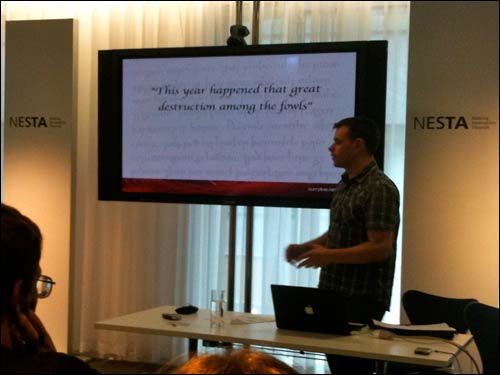Follow-up journalism? Timeless journalism? It is the tyranny of chronology that gets in the way...
All of this made me re-read my presentation from last year's News Innovation Unconference in London - "The tyranny of chronology"
In it, I argued that our concept of reporting news in strict chronological order hadn't changed significantly since the days of the Anglo-Saxon Chronicle - and perhaps from even before then if you follow this timeline of timelines.

What concerned me was that despite the acres and acres of coverage on a topic like climate change churned out by the news industry around the globe over the last few years, schoolchildren inevitably head to Wikipedia to get a quick summary for their homework. Somehow we don't manage to synthesize our news content into those bitesize chunks, instead relying on the reader to supply their own background knowledge and context to a constant stream of quick wrap-ups of the previous 24 hours.
Or increasingly, with the live blogging and tweeting of news on the web, the previous 2.4 minutes.
In the talk I suggested that we needed better metadata - both editorially added and automatically derived - in order to provide the right news atoms for the 21st century, and needed to champion the use of journalism centred design for our publishing systems and workflows.
You can download the essay version of "The tyranny of chronology" as a single PDF, read it in 5 parts online starting here, or watch some video of me presenting it from YouTube: Part 1 | Part 2 | Part 3.

Photograph of Martin Belam at 'News Innovation' July 2009 by Adam Tinworth
It's unfortunate that I'm only reading this now — your essay on the tyranny of chronology covers a lot of the same ground as a series on IA for news websites I did earlier this year. Then again, perhaps it's a good sanity check to see other people advocating for the same changes to how we handle news content, independently: the importance of extensive metadata and the importance not just of creating content but of managing it as well, and how current CMSes do a lousy job in that regard.
"It seems simply crazy to me that at a time when we are producing more media content than ever before, we are employing less and less people to expertly curate it - leaving it instead to machines and systems that we have not trained properly to deal with the complexity and nuances of our news 'language'." Yes!
The trouble is probably that metadata-driven systems prove their worth only over the long term, require an effort in annotating archival content and always involve custom development, which makes them a hard sell.
Could you provide an English translation of that piece of text? It intrigues me really!
Tim, did you want me to translate the Anglo-Saxon, or are you just suggesting that my prose style is a little tricky?
great post. I think you nailed this one. The 24/7 constant flow of information almost makes it impossible to get quality information. It is critical to develop your trusted sources for information and take all else with a grain of salt.
Thanks Again,
Jake
Google offers a timeline view among their various options along the left hand side of it's search page...
IMO, I don't think there is such a thing as timeless journalism. 30 years ago, maybe yes, but a defo No for now. Like you said wiki and google are our best friend. We are in the era of News and updates come to us, not the other way round. As a Gen Y, we are always hunger for latest news regardless. It is a trendy thing to be updated and all updates are like flings - you will forget about what the previous news was once you have another new update. What do you think?
Winnie
Rewards Program@Myzerr
That's indeed true. News industry is getting bored of chronicles. As the social Networking platforms boom, Twitter becomes the source of news. Twitter comes the first, and the news comes the second. Revolution is required to subvert the tyranny.